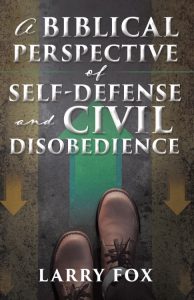A Biblical Perspective of Self-Defense
Reading time: 4 minutes

The following is an excerpt from a book by Larry Fox, A Biblical Perspective of Self-Defense and Civil Disobedience (Second Edition, Copyright © 2019)
Book Excerpt
Old Testament Background
We’ll begin by looking at the Old Testament. Although we’re not under Old Testament law, it contains the most specific language about self-defense and reveals God’s eternal standards and perspective. The Old Testament clearly states that God created man in his own image and intended for him to rule the earth (Gen. 1:26 – 28). Man’s ability to make decisions and govern derives from his godly image and delegated authority. As we’ll see, man’s God-like nature also leads to strict standards regarding the treatment of people.
Is Killing a Person Always Murder?
This question is at the root of many people’s opinions about self-defense. If one believes killing is synonymous with murder, then it’s never appropriate to use deadly force, even defensively. This is a common argument against private gun ownership, for example.
God said to Noah, “from each man, too, I will demand an accounting for the life of his fellow man. Whoever sheds the blood of man, by man shall his blood be shed; for in the image of God has God made man” (Gen. 9:5 – 6). So God created a system of capital punishment: man was to take the life of whoever sheds another man’s blood. Because God made man in his own image, murder becomes a crime against God and demands capital punishment. There’s no provision in the Old Testament for rehabilitation of a murderer.
With God’s statement to Noah as background, we gain insight to the Old Testament law, including the Ten Commandments. The sixth commandment is a statement relevant to the value of human life: “You shall not murder” (Exod. 20:13; Deut. 5:17). Some of the debate about killing and murder is the result of which Bible translation a person uses. There are two Hebrew words most frequently translated “kill” or “murder”; one primarily means to destroy or kill and the other primarily refers to killing intentionally with premeditation. The second word is the one used in the sixth commandment, so the more precise translation is “You shall not murder” rather than “You shall not kill.”
There are those who view every act that ends a human life as murder and they use the sixth commandment as proof that capital punishment violates God’s will. However, the original language of the commandment doesn’t support their position.
As we’ll see in the next section, God demanded capital punishment for specific crimes. Since murder is a capital offense and he requires people to put the murderer to death, God clearly does not equate killing with murder….
Use of Deadly Force
Throughout history, Israel has been surrounded by enemies, but God pledged to give the Israelites victory even if their enemies outnumbered them (Lev. 26:8; Deut. 20:1 – 4). When Israel entered the Promised Land, he even directed them to annihilate the people who lived there, so they wouldn’t encourage the Israelites to worship false gods (Deut. 7:1 – 2; 20:16 – 18). So God clearly sanctioned the use of deadly force by the nation.
God also sanctioned the use of deadly force by an individual in certain circumstances. For example, if a thief was caught breaking into a home at night, the homeowner had the right to kill the intruder in protection of his family and property. But if the incident occurred during the day, presumably when the homeowner could properly judge the intruder’s intentions and the intruder could see the homeowner was present and willing to defend his household, the homeowner shouldn’t kill the intruder (Exod. 22:2 – 3).
When God gave instructions on allotment of the Promised Land, he required them to designate cities of refuge, which were to be safe locations for someone who accidentally killed another. In the descriptions of these cities, we find references to an “avenger” or “avenger of blood.” The avenger couldn’t capture or kill the allegedly guilty person if the death was accidental, as long as he stayed in the city of refuge before he stood trial (Josh. 20:5, 9). If the person was convicted of murder, however, the city elders would hand him over to the avenger to die (Deut. 19:11 – 12). God clearly authorized the use of deadly force by the nation of Israel and by individuals under certain conditions….
New Testament: Different Purpose and Emphasis
The Old Testament relates to man’s earthly existence in the period before Christ. The New Testament, on the other hand, focuses on repentance and spiritual development rather than physical existence….
(End of book excerpt)
